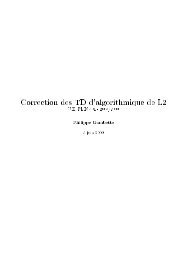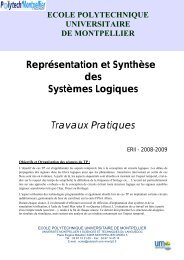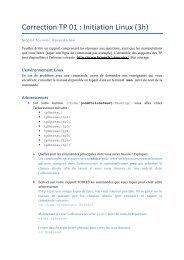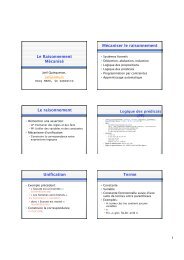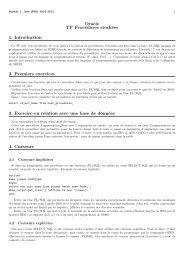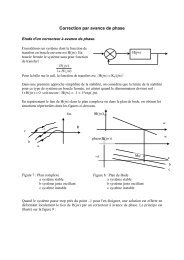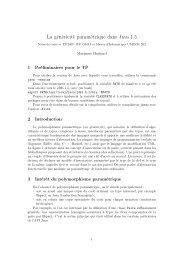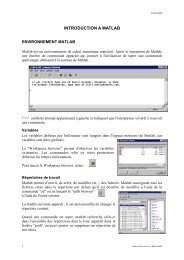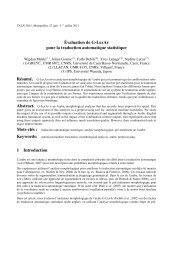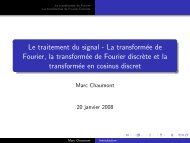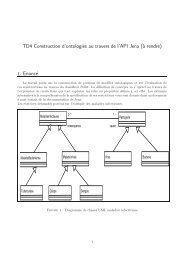Evaluating User Experience in Games: Concepts and Methods - Lirmm
Evaluating User Experience in Games: Concepts and Methods - Lirmm
Evaluating User Experience in Games: Concepts and Methods - Lirmm
Create successful ePaper yourself
Turn your PDF publications into a flip-book with our unique Google optimized e-Paper software.
4 R. Bernhaupt<br />
experience like immersion, fun, or flow to better underst<strong>and</strong> the concept of user<br />
experience.<br />
This chapter gives an overview on both aspects. First, an overview on def<strong>in</strong>itions<br />
of user experience <strong>in</strong> the area of HCI is given, followed by some basic terms that<br />
are currently used <strong>in</strong> the games <strong>in</strong>dustry like immersion, flow, or playability. Then<br />
an overview on currently applied methods for the evaluation of user experience <strong>in</strong><br />
games is given. This overview also <strong>in</strong>cludes all of the methods that are proposed,<br />
described, discussed, <strong>and</strong> presented <strong>in</strong> the follow<strong>in</strong>g chapters of the book. To allow<br />
an easy overview on the currently applied methods for user experience evaluation,<br />
the most commonly used methods are presented. To help identify the applicability<br />
of the various user experience evaluation methods, the methods are presented<br />
follow<strong>in</strong>g four major development phases: <strong>in</strong>itial stages of game development, early<br />
development stages, prototypical stage <strong>and</strong> later (implementation) stages, <strong>and</strong> f<strong>in</strong>ally<br />
alpha <strong>and</strong> beta phases.<br />
1.2 Def<strong>in</strong><strong>in</strong>g <strong>User</strong> <strong>Experience</strong><br />
How user experience should be def<strong>in</strong>ed is currently discussed <strong>in</strong> the HCI community.<br />
<strong>User</strong> eXperience (UX) still misses a clear def<strong>in</strong>ition. As of today, the term user<br />
experience can be seen as an umbrella term used to stimulate research <strong>in</strong> HCI to<br />
focus on aspects which are beyond usability <strong>and</strong> its task-oriented <strong>in</strong>strumental values<br />
(Hassenzahl 2003). <strong>User</strong> experience does <strong>in</strong>clude a look on all the (qualitative)<br />
experience a user is mak<strong>in</strong>g while <strong>in</strong>teract<strong>in</strong>g with a product (McCarthy <strong>and</strong> Wright<br />
2004), or on experiences made dur<strong>in</strong>g <strong>in</strong>teract<strong>in</strong>g with a special type of product,<br />
e.g., a mobile phone (Roto 2006). The current ISO def<strong>in</strong>ition on user experience<br />
focuses on a person’s perception <strong>and</strong> the responses result<strong>in</strong>g from the use or anticipated<br />
use of a product, system, or service. From a psychological perspective, these<br />
responses are actively generated <strong>in</strong> a psychological evaluation process, <strong>and</strong> it has<br />
to be decided which concepts can best represent the psychological compartments <strong>in</strong><br />
games to allow to measure the characteristics of user experience (see Takatalo et al.,<br />
Chapter 3).<br />
<strong>User</strong> experience <strong>in</strong> games has been evaluated us<strong>in</strong>g a variety of concepts <strong>in</strong>clud<strong>in</strong>g<br />
immersion, fun, presence, <strong>in</strong>volvement, engagement, flow (see Takatalo et al.,<br />
Chapter 3), play, <strong>and</strong> playability – <strong>and</strong> what makes play fun, <strong>in</strong>clud<strong>in</strong>g social play<br />
(see Isbister, Chapter 2). Given that user experience is understood as the subjective<br />
relationship between user <strong>and</strong> application (McCarthy <strong>and</strong> Wright 2004), Calvillo-<br />
Gámez (Chapter 4) proposes the CEGE approach to allow to differentiate between<br />
different subjective experiences. Other evaluation approaches focus<strong>in</strong>g on experiences<br />
<strong>and</strong> attitudes toward video games are the use of semantic differentials (Lemay<br />
et al., Chapter 6). From an <strong>in</strong>dustry perspective, the tools currently <strong>in</strong> use to enable<br />
the evaluation of user experience are closely connected to the game development<br />
phases. E. Brown (Chapter 5) describes tools used <strong>in</strong> games <strong>in</strong>dustry accord<strong>in</strong>g to<br />
the various development phases. Dur<strong>in</strong>g the concept phase, classical user-centered




